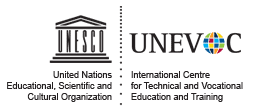Across the world in the last decade youth unemployment rates have increased. One of the main reasons for high youth unemployment globally is a growing mismatch between the supply and demand for skills, which is disproportionately affecting young people, particularly in developing countries. This skills mismatch can take different forms: some countries for example may experience an excess supply of skilled workers with a shortage of skilled jobs; in others young people may simply lack the basic skills, e.g. literacy and numeracy skills, which would enable them to find jobs or start their own business. Since young people comprise a large and growing proportion of the world’s working-age population, their employment prospects affect future economic growth. And of course, prolonged unemployment can have a devastating effect on young people’s economic and personal welfare and self-esteem.
UNESCO-UNEVOC believes that TVET has a key role to play in tackling youth unemployment. TVET’s orientation towards the world of work and the acquisition of employable skills means that it is well placed to overcome the skills mismatches that have impeded smooth education to employment transitions for many young people.
The topic of youth and skills was selected by Members of the UNEVOC Network as a priority theme in 2012. In the broader theme of skills for young people, UNESCO-UNEVOC’s work has focused in particular on school-to-work transition and entrepreneurship education.
 | 17 September 2015Virtual Conference: UNESCO’s future TVET strategy From 28 September to 3 October, you will have the chance to participate in our next virtual conference on UNESCO’s future strategy for TVET (2016-2021). This online conference will be moderated by Mike Campbell, an expert in the fields of skills, labour markets and the economy. ( more) |
|
 | 16 July 2015World Youth Skills Day at UNEVOCOn 15 July 2015, some 50 young people attended UNESCO-UNEVOC’s commemoration of the UN’s inaugural World Youth Skills Day at the UN Campus in Bonn, Germany. ( more) |
|
 | 15 July 2015Celebrate World Youth Skills Day on 15 July!Join the United Nations in New York and Bonn in celebrating the first-ever World Youth Skills Day! The goal of this celebration is to achieve better socio-economic conditions for today’s youth and to address issues of unemployment. ( more) |
|
|
 | 29 May 2015Virtual conference: Delivering TVET through Quality Apprenticeships From 15 to 26 June 2015, you will have the chance to participate in our next virtual conference on “Delivering TVET through Quality Apprenticeships". This online conference will be moderated by Alessandra Molz, an international consultant and researcher on skills development and the labour market. ( more) |
|
|
|
 | 20 October 2014UNESCO-UNEVOC launches Skills in Action Award UNESCO-UNEVOC has launched the Skills in Action Award to celebrate success stories of young people in technical and vocational education and training (TVET) and is calling for young people across the globe to share their stories. ( more) |
|
|
|
|
|
 | 16 April 2014Flipping the switch to solve youth unemployment in EuropeWhat are the skills and competencies needed from a young person to be successful in finding a job? This was among the key questions during the Europe Youth to Business Forum: Flipping the Switch to Solve Youth Unemployment in Europe, organized by AIESEC on 7 April 2014 in Warsaw, Poland. ( more) |
|
|
|
 | 29 October 2013Conference on rural skills development through ICTFrom 25 to 26 October 2013, INRULED in collaboration with UNESCO-UNEVOC, Chengdu Municipal Education Bureau, and Dujiangyan Municipal Government organized a conference on rural skills development through Information Communication Technologies (ICT). ( more) |
|
|
|
|
 | 27 August 2013Strengthening regional harmonization for the transformation of TVET To strengthen global and regional harmonization for the advancement of TVET transformation through the capacities of UNEVOC's unique global Network of specialized TVET institutions and affiliated partners, the UNESCO-UNEVOC International Centre is organizing a series of meetings to be held in all regions of the world.
( more) |
|
|
|
|
|
|
 | 3 March 2014Meeting report of the Africa Regional ForumMeeting report of the Africa Regional Forum (17-18 September 2013, Abuja, Nigeria) on Advancing TVET for Youth Employability and Sustainable Development now available online ( more) |
|
|
|
|
|

































